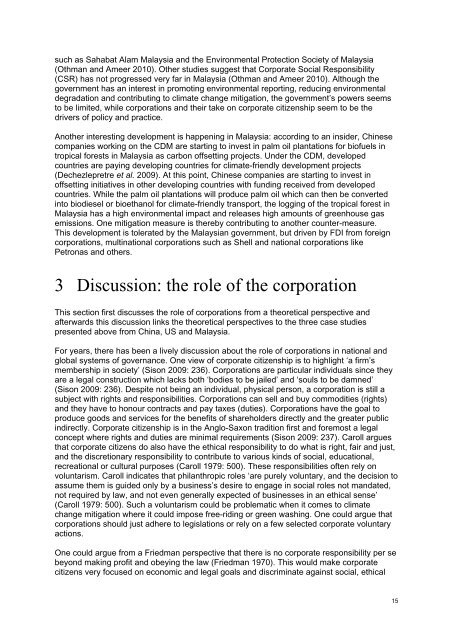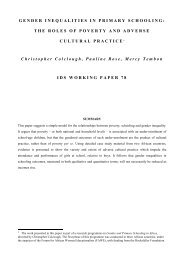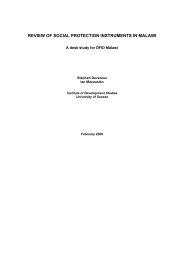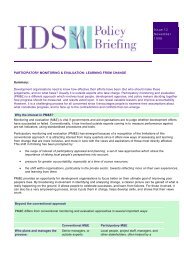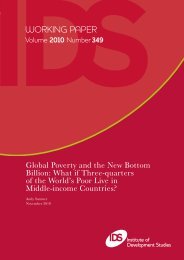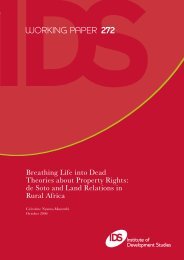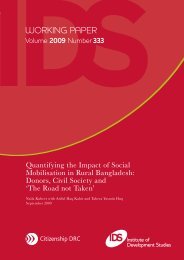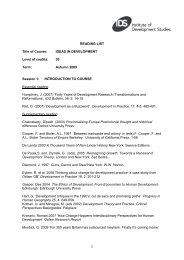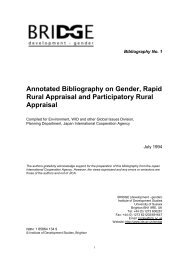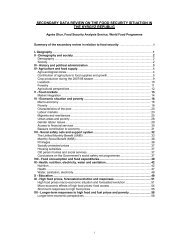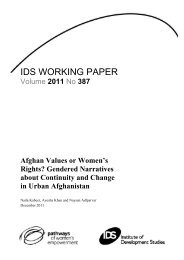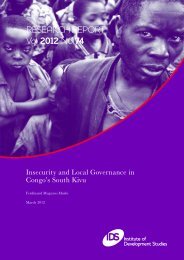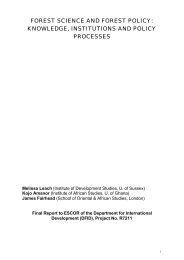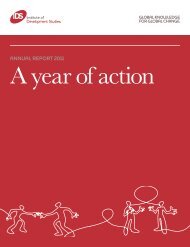IDS WORKING PAPER - Institute of Development Studies
IDS WORKING PAPER - Institute of Development Studies
IDS WORKING PAPER - Institute of Development Studies
Create successful ePaper yourself
Turn your PDF publications into a flip-book with our unique Google optimized e-Paper software.
such as Sahabat Alam Malaysia and the Environmental Protection Society <strong>of</strong> Malaysia<br />
(Othman and Ameer 2010). Other studies suggest that Corporate Social Responsibility<br />
(CSR) has not progressed very far in Malaysia (Othman and Ameer 2010). Although the<br />
government has an interest in promoting environmental reporting, reducing environmental<br />
degradation and contributing to climate change mitigation, the government’s powers seems<br />
to be limited, while corporations and their take on corporate citizenship seem to be the<br />
drivers <strong>of</strong> policy and practice.<br />
Another interesting development is happening in Malaysia: according to an insider, Chinese<br />
companies working on the CDM are starting to invest in palm oil plantations for bi<strong>of</strong>uels in<br />
tropical forests in Malaysia as carbon <strong>of</strong>fsetting projects. Under the CDM, developed<br />
countries are paying developing countries for climate-friendly development projects<br />
(Dechezlepretre et al. 2009). At this point, Chinese companies are starting to invest in<br />
<strong>of</strong>fsetting initiatives in other developing countries with funding received from developed<br />
countries. While the palm oil plantations will produce palm oil which can then be converted<br />
into biodiesel or bioethanol for climate-friendly transport, the logging <strong>of</strong> the tropical forest in<br />
Malaysia has a high environmental impact and releases high amounts <strong>of</strong> greenhouse gas<br />
emissions. One mitigation measure is thereby contributing to another counter-measure.<br />
This development is tolerated by the Malaysian government, but driven by FDI from foreign<br />
corporations, multinational corporations such as Shell and national corporations like<br />
Petronas and others.<br />
3 Discussion: the role <strong>of</strong> the corporation<br />
This section first discusses the role <strong>of</strong> corporations from a theoretical perspective and<br />
afterwards this discussion links the theoretical perspectives to the three case studies<br />
presented above from China, US and Malaysia.<br />
For years, there has been a lively discussion about the role <strong>of</strong> corporations in national and<br />
global systems <strong>of</strong> governance. One view <strong>of</strong> corporate citizenship is to highlight ‘a firm’s<br />
membership in society’ (Sison 2009: 236). Corporations are particular individuals since they<br />
are a legal construction which lacks both ‘bodies to be jailed’ and ‘souls to be damned’<br />
(Sison 2009: 236). Despite not being an individual, physical person, a corporation is still a<br />
subject with rights and responsibilities. Corporations can sell and buy commodities (rights)<br />
and they have to honour contracts and pay taxes (duties). Corporations have the goal to<br />
produce goods and services for the benefits <strong>of</strong> shareholders directly and the greater public<br />
indirectly. Corporate citizenship is in the Anglo-Saxon tradition first and foremost a legal<br />
concept where rights and duties are minimal requirements (Sison 2009: 237). Caroll argues<br />
that corporate citizens do also have the ethical responsibility to do what is right, fair and just,<br />
and the discretionary responsibility to contribute to various kinds <strong>of</strong> social, educational,<br />
recreational or cultural purposes (Caroll 1979: 500). These responsibilities <strong>of</strong>ten rely on<br />
voluntarism. Caroll indicates that philanthropic roles ‘are purely voluntary, and the decision to<br />
assume them is guided only by a business’s desire to engage in social roles not mandated,<br />
not required by law, and not even generally expected <strong>of</strong> businesses in an ethical sense’<br />
(Caroll 1979: 500). Such a voluntarism could be problematic when it comes to climate<br />
change mitigation where it could impose free-riding or green washing. One could argue that<br />
corporations should just adhere to legislations or rely on a few selected corporate voluntary<br />
actions.<br />
One could argue from a Friedman perspective that there is no corporate responsibility per se<br />
beyond making pr<strong>of</strong>it and obeying the law (Friedman 1970). This would make corporate<br />
citizens very focused on economic and legal goals and discriminate against social, ethical<br />
15


